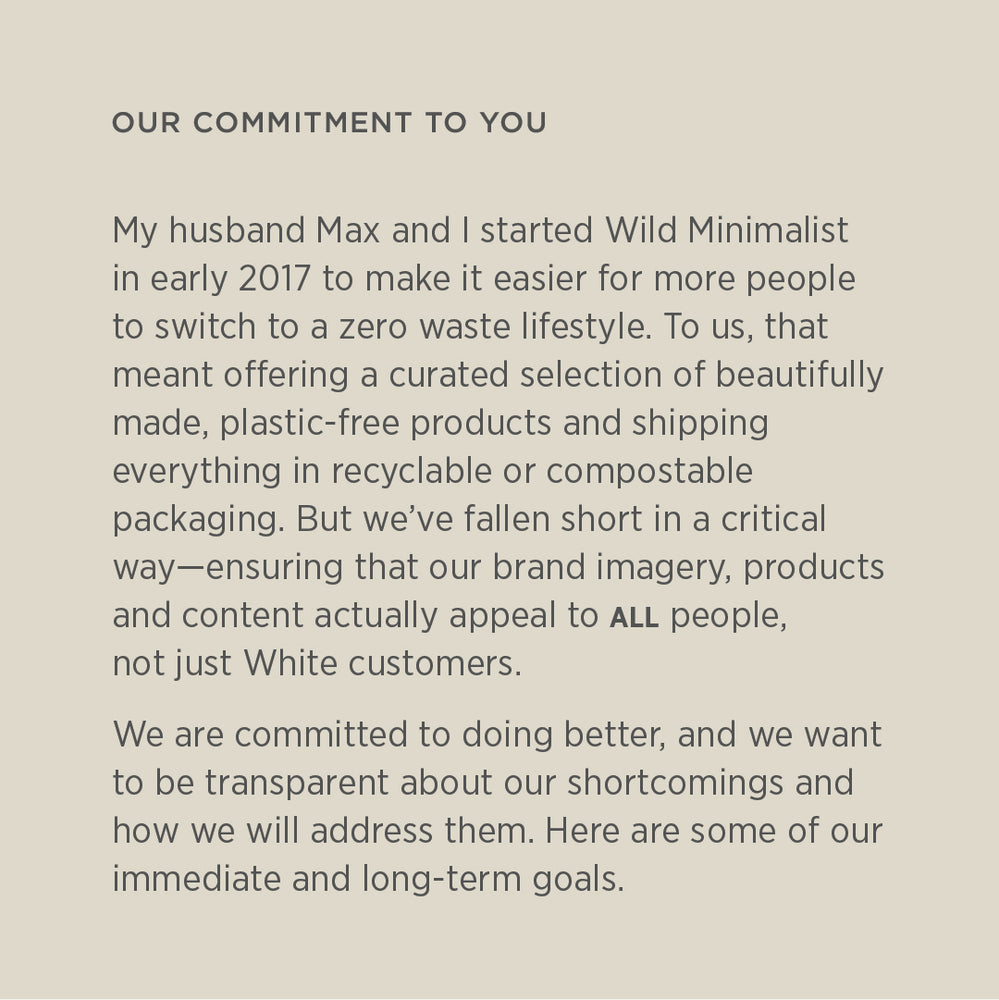It shouldn’t take the murder of three unarmed Black people—George Floyd, Breonna Taylor and Ahmaud Arbery, adding to the long list of fatal arrests—for White people to acknowledge the ugly realities of institutional racism and police brutality. And yet, here we are. As the nation and global community come together to mourn and protect Black lives and demand police accountability, many White people and businesses are reckoning with the ways we have contributed to and benefited from systemic racism.
My husband Max and I are both White. We started Wild Minimalist in early 2017 to help make it easier for more people to switch to a low waste lifestyle. To us, that meant offering a curated selection of beautifully made, plastic-free products and shipping everything in recyclable or compostable packaging. But we’ve fallen short in a critical way—ensuring that our brand imagery, products and content actually appeal to ALL people, not just White customers.
We are committed to doing better, and we want to be transparent about our shortcomings and how we will address them. Here are some of our immediate and long-term goals.
- Promote diverse voices in the zero waste movement. The zero waste and environmental movements have been dominated by White voices, even though there are an abundance of diverse and vocal participants (and BIPOC communities are disproportionately impacted by climate change and pollution). Our plan is to partner with BIPOC influencers in the zero waste community, offering our platform to help amplify their voices, while compensating them fairly.
- Hire BIPOC team members. Our staff is currently small, Max, myself and three part-time female employees, and entirely White. But, we are growing and want to ensure that as we expand, our company attracts diverse talent and we foster an inclusive and welcoming culture. To do so, we are working with King’s Dream Consulting to create best practices for recruiting and working with BIPOC employees and freelancers. We are also relocating our store from San Anselmo, CA (90% White) to San Rafael, CA (52% White) to help attract diverse candidates.
- Update marketing materials. I’ve personally been both behind the camera (for product photography) and in front of the camera to model various products and aspects of low waste living. As such, our website and social media solely feature me, a White woman. More recently, we’ve been collaborating with San Francisco-based photographer, Nicole Morrison, to capture the beautiful still life and lifestyle images featured throughout our new website. We will continue to partner with Nicole as we hire models of all skin tones and sizes to refresh our brand and appeal to a more diverse customer base.
- Add more products from BIPOC businesses. We are in the process of identifying low waste brands run by BIPOC businesses to add to our store. We will be reaching out to those businesses to learn more about their wholesale offerings and explore ways to promote their brands, while being mindful that they may be inundated by these requests. We are always interested to hear about low waste products you’d like to see in our store, and you can contact us here. Our goal is to add five new businesses by the end of this year.
- Commit to ongoing self work. We still have a lot of work to do to become better business owners and human beings. We want to be mindful about how we can sustain our personal growth over the long term and recognize that it will take a lifelong commitment to become true BIPOC allies. We have both read White Fragility by Robin DiAngelo, are currently reading So You Want to Talk About Race by Ijeoma Oluo and regularly listen to Code Switch on NPR—and highly recommend all three resources. We are also educating ourselves about intersectional environmentalism and learning from the leaders at the forefront.
We want to acknowledge that communicating our goals to build a more diverse brand is one thing, but taking meaningful action and measuring our progress is more important. It will take time for us to change, but we are committed to fostering a more inclusive zero waste movement that represents the collective views of this community.
Until then, we are listening, we are reflecting and we are taking action.
In Solidarity,
Lily & Max Cameron, Co-Founders of Wild Minimalist

